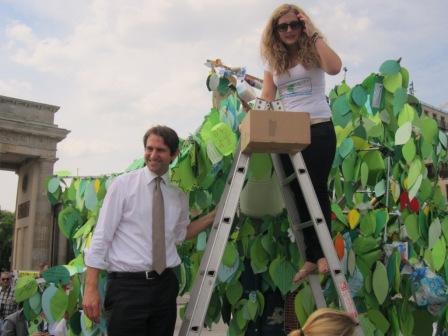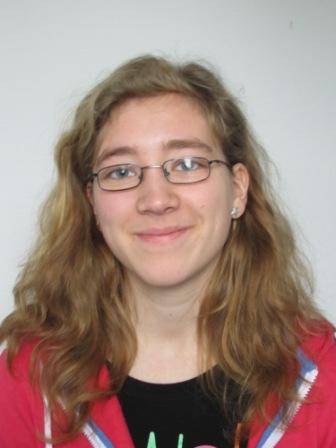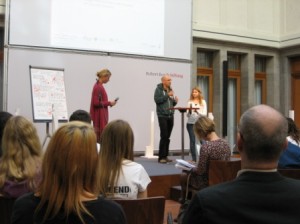The tricky job of hammering out a climate wishlist
 The first World Youth Sustainability concluded in Berlin recently. It brought together over 150 young people from 31 countries who met policymakers and experts to talk about how their dream of a more sustainable, equitable world could be realized. Two young participants, Anne-Sophie Risse and Teresa Thalmaier, describe their experiences at the tightly-packed summit.
The first World Youth Sustainability concluded in Berlin recently. It brought together over 150 young people from 31 countries who met policymakers and experts to talk about how their dream of a more sustainable, equitable world could be realized. Two young participants, Anne-Sophie Risse and Teresa Thalmaier, describe their experiences at the tightly-packed summit.
Anne-Sophie Risse, youthinkgreen-Team Osnabrück:
Friday, May 17 – Day seven of our first World Youth Sustainability Summit. Off to an early start – my alarm rings at 6 a.m. It’s not so unusual really since I get up at that hour anyway during a normal school week. But yesterday was a long day. We spent the whole day at the Pariser Platz in central Berlin for our Tree of Hope project. It’s made of trash and has pages bearing the wishes, demands, hopes and requests from us and from other people addressed to lawmakers, governments and people around the world.
Now, early Friday morning, it’s our job to hand over the Tree of Hope to German Environment Minister Peter Altmaier. We – that is 160 young people from 31 countries – arrive at the ministry at 8 a.m. We’d come together in Berlin to draft a document expressing what we want to policymakers, business and society. Our meeting with Altmaier lasts just 15 minutes.
 In order to get a solid understanding of some of the issues that made it into the document, we’ve been listening to daily talks by various experts on climate change and other topics. Today, it’s the turn of renowned climate researcher Hans Joachim Schellnhuber. We head to the Potsdam Institute for Climate Impact Research to hear him speak. He’s very competent and understanding and begins his talk by saying “I’ll wake you up when something important comes up!” In addition to several interesting facts on climate change, I take away this impression from the talk – if there’s an acute, common problem then even nations that are sworn enemies can manage to work together.
In order to get a solid understanding of some of the issues that made it into the document, we’ve been listening to daily talks by various experts on climate change and other topics. Today, it’s the turn of renowned climate researcher Hans Joachim Schellnhuber. We head to the Potsdam Institute for Climate Impact Research to hear him speak. He’s very competent and understanding and begins his talk by saying “I’ll wake you up when something important comes up!” In addition to several interesting facts on climate change, I take away this impression from the talk – if there’s an acute, common problem then even nations that are sworn enemies can manage to work together.
I wonder if things have to go that far. With that thought, we head to the next workshop “Climate change – an intergenerational problem.” Carl-Friedrich Schleußner is the expert in this case and says that people need to live in such a way so that life for successive generations is at least just as good. It’s a topic you can discuss forever. So that the day doesn’t end on too theoretical a note, we’re shown videos by the “ClimateMediaFactory.org” – the world as a user of a network dubbed “Earthbook.” The videos were really well done.
Teresa Thalmaier, youthinkgreen-Team Windhoek:
After absorbing so many new impressions, faces, fascinating lectures and different cultures, we headed to the Konrad Adenauer Foundation.
“If you thought the last few days were grueling, then you’d better get prepared for something really tough today. But that’s what you’ll take home with you, something you can be proud of.” That’s how Helmut Spiering, the project founder of youthinkgreen, welcomed us.
Another two long hours to go before lunch. Initially, we sat in groups of maximum ten young people and racked our brains – what do we actually want? What needs to change? How can we shape our world in a more sustainable manner? How can you achieve that aim?
It sounds easier than it is. How do you formulate things that are politically correct and still compelling? But we weren’t the only ones struggling with the problem. After another discussion in a smaller circle, further groups were created. Now four larger with 40 members each worked on their wish lists. Exhausted, we dragged ourselves off to lunch to recharge our batteries. We all really needed it!
But the tough part was still to come. We were asked to discuss the four wish lists from all the groups and to combine then. We – 160 young people from 31 countries – sat excitedly in a large conference room. There were so many different cultures and languages represented. But all that wasn’t meant to hinder us.
The most difficult part often was formulating the document. Often, our statements weren’t concrete enough, at times superfluous – though there were really good ideas behind them. We gained a deep insight into how a parliament works, how politics is done on an international stage. At the end, we had our final document. It’s unbelievable what we achieved in the last weeks and I’m happy to be a part of the youthinkgreen family!






